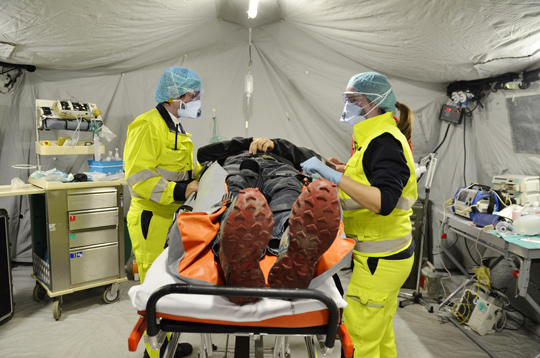Concepts that Provide Direction During Crises
Freiburg, Mar 31, 2020
When the NO-FEAR network began working in 2018, events in Barcelona, London, Nice, or Berlin were considered the greatest conceivable calamity. These were namely, politically motivated terrorist attacks on civil society carried out by individuals or groups. Nobody was thinking of a devastating pandemic. Now the network, which has grown to have two hundred members in the meantime, is becoming a central platform for European exchange with respect to the corona epidemic.
 Who is treated first – and who has to wait for medical help? Nils Ellebrecht is examining the process of triage. Photo: fabrus/stock.adobe.com
Who is treated first – and who has to wait for medical help? Nils Ellebrecht is examining the process of triage. Photo: fabrus/stock.adobe.com
In just these times, rescue and emergency medical facilities, companies, and research institutes from all over Europe see the NO-FEAR network as an important platform for sharing information. NO-FEAR stands for “Network Of practitioners For Emergency medicAl systems and cRitical care.” The European Union (EU) funds the project. A sociologist at the Freiburg Centre for Security and Society (CSS), Nils Ellebrecht, coordinates the network’s research on the ethical, legal, and social aspects of emergency medicine. The CSS consolidates a great deal of what is important to society as the corona crisis makes its impact. Since 2009, the CSS has been carrying out interdisciplinary research on public safety.
The NO-FEAR consortium is led by Crimedim, a research institute in the Italian city of Novara. As a result, network members had information about the experience of the respiratory disease Covid-19 early on. What is more, key rescue and emergency response organizations from northern Italy, France, and Spain are members. In recent weeks, the network has held two webinars on the epidemic. A total of 580 people took part. Nils Ellebrecht organized the second webinar.
The specter of triage
In his dissertation – completed in 2019 – Ellebrecht focused on triage, an issue which for the last few weeks has been a ever-present specter in the media. Triage is the process that medical personnel use to prioritize when which patients are to be treated. In Germany, triage regained relevance in the 1960s, when hospitals began to obtain dialysis machines. Ellebrecht uses the words “ethically bitter” to describe doctors who decided who would be permitted to benefit from the new technology.
He explains that when one life is weighed against another there can be no satisfactory solution. It is a dilemma, he says. Nevertheless, the sociologist continues, concepts and guidelines are indispensable. A purely situational, unplanned triage, he says, is the poorer alternative, concluding that guidelines must therefore be rapidly developed and discussed. The example of Italy has shown how important wide-ranging discussion is ahead of time, says Ellebrecht, to include the public as well. (Editor’s note: Shortly after the interview with Nils Ellebrecht, a coalition of specialist medical associations published corresponding recommendations.)
What is the basis for the rescue plan?
As a sociologist, the researcher is interested in the societal dimensions of emergency response plans. Says Ellebrecht, “That’s because who is to be saved and who isn’t is not just a medical, diagnostic, or treatment decision. Considering the remaining years of life or quality of life are not medical criteria. Instead they are based on societal norms. In less turbulent times, the medical profession would be well-advised to consult with specialists in ethics and sociology and conduct a dialogue with the public about these concepts.” Especially when the logic of triage is applied even to staff who are short of personal protective equipment (PPE). For example, better equipment is provided to those who have closer contact with patients. These are doctors as a rule. Ellebrecht says that it is difficult to discuss the subject of this type of unequal treatment.
The sociologist is observing how every political system is devising its own approach to handling the pandemic according to their experiences and cultural values. He says that it is striking that while in Germany an appeal is being made to the sense of voluntary obligation of modern political subjects, in China authoritarian measures were implemented with the aid of the military. Meanwhile in South Korea, says Ellebrecht, a different path was taken. There, the government is trying to use information technology and complete transparency to contain the crisis.
Sharing emergency plans and discussing them are the actual aims of NO-FEAR. The network’s name may be an acronym, but the sociologist says it can also be taken literally: “The guiding principle is to develop good emergency practices and share them at a European level in order to reduce the degree of fear in a crisis. In an emergency, it’s good to have a tried-and-tested concept that shows the way.”
Annette Hoffmann
Centre for Security and Society

